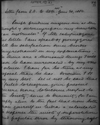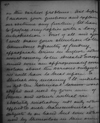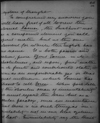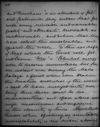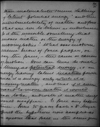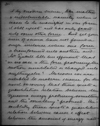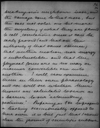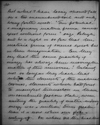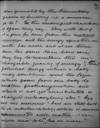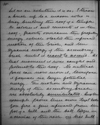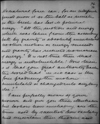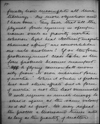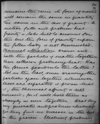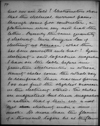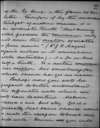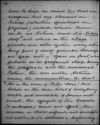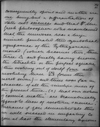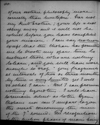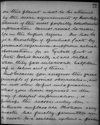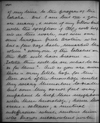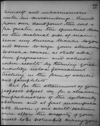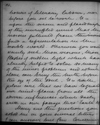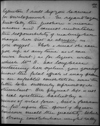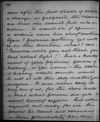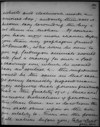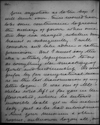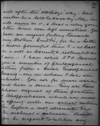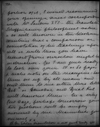Mahatma Letter No. 65
| Quick Facts | |
|---|---|
| People involved | |
| Written by: | Koot Hoomi |
| Received by: | A. O. Hume |
| Sent via: | unknown |
| Dates | |
| Written on: | unknown |
| Received on: | June 30, 1882 |
| Other dates: | unknown |
| Places | |
| Sent from: | unknown |
| Received at: | Simla, India |
| Via: | unknown |
This is Letter No. 65 in The Mahatma Letters to A. P. Sinnett, 4th chronological edition. It corresponds to Letter No. 11 in Barker numbering. See below for Context and background.
No color slides are available, but black-and-white images have been taken from microfilm.
< Prev letter chrono
Next letter chrono >
< Prev letter Barker
Next letter Barker >
Page 1 transcription, image, and notes
|
Note in Sinnett's handwriting: Simple prudence misgives me at the thought of entering upon my new role of an "instructor." If M. satisfied you but little I am afraid of giving you still less satisfaction since besides being restrained in my explanations, — for there are a thousand things I will have to leave unrevealed — by my vow of silence I have far less time at my disposal than he has. However, I'll try my best. Let it not be said that I failed to recognise your present sincere desire to become useful to the Society, hence to Humanity, for I am deeply alive to the fact that none better than yourself in India is calculated to disperse the mists of superstition and popular error by throwing light |
|
NOTES: |
Page 2
|
on the darkest problems. But before I answer your questions and explain our doctrine any further, I'll have to preface my replies with a long introduction. First of all and again I will draw your attention to the tremendous difficulty of finding appropriate terms in English which would convey to the educated European mind even an approximately correct notion about the various subjects we will have to treat upon. To illustrate my meaning I'll underline in red the technical words adopted and used by your men of Science and which withal are absolutely misleading not only when applied to such transcendental subjects as on hand but even when used by themselves in their own |
NOTES: |
Page 3
|
system of thought.
|
NOTES: |
Page 4
|
and Christians "is an attribute of God" and forthwith they endow that God with every mutable and variable quality and attribute, knowable as unknowable, and believe that they have solved the unsolvable and squared the circle. To this we reply if that which the theists call God, and science "Force" and "Potential Energy," were to become immutable but for one instant even during the Maha-Pralaya a period when even Brahm the creative architect of the world is said to have merged into non-being, then there could be no manwantara, and space alone would reign unconscious and supreme in the eternity of time. Nevertheless, Theism when speaking of mutable immutability is no more absurd |
NOTES: |
Page 5
|
than materialistic science talking of "latent potential energy," and the indestructibility of matter and force. What are we to believe as indestructible? Is it the invisible something that moves matter or the energy of moving bodies! What does modern science know of force proper, or say the forces, — the cause or causes of motion. How can there be such a thing as potential energy, i.e., an energy having latent inactive power since it is energy only while it is moving matter, and that if it ever ceased to move matter it would cease to be, and with it matter itself would disappear. Is force any happier term? Some thirty-five years back a Dr. Mayer offered the hypothesis now accepted as an axiom that force in the sense given |
NOTES:
|
Page 6
|
it by modern science, like matter is indestructible namely when it ceases to be manifest in one form it still exists and has only passed into some other form. And yet your men of science have not found a single instance where one force is transformed into another, and Mr. Tyndall tells his opponents that "in no case is the force producing the motion annihilated or changed into anything else." Moreover we are indebted to modern science for the novel discovery that there exists a quantitative relation between the dynamic energy producing something and the "something" produced. Undoubtedly there exists a quantitive relation between cause and effect, between the amount of energy used in |
NOTES:
|
Page 7
|
breaking one's neighbour's nose, and the damage done to that nose, but this does not solve one bit more the mystery of what they are pleased to call correlations, since it can be easily proved (and that on the authority of that same science) that neither motion nor energy is indestructible and that the physical forces are in no way or manner convertible one into another. I will cross-examine them in their own phraseology and we will see whether their theories are calculated to serve as a barrier to our "astounding doctrines." Preparing as I do to propound a teaching diametrically opposed to their own it is but just that I should clear the ground of scientific rubbish |
NOTES: |
Page 8
|
lest what I have to say should fall on a too encumbered soil and only bring forth weeds. "This potential and imaginary materia prima cannot exist without form," says Raleigh, and he is right in so far that the materia prima of science exists but in their imagination. Can they say the same quantity of energy has always been moving the matter of the Universe? Certainly not so long as they teach that when the elements of the material cosmos, elements which had first to manifest themselves in their uncombined gaseous state, were uniting[,] the quantity of matter-moving energy was a million times greater than it is now when our globe is cooling off. For where did the heat that |
NOTES:
|
Page 9
|
was generated by this tremendous process of building up a universe go to? To the unoccupied chambers of space they say. Very well, but if it is gone for ever from the material universe and the energy operative on earth has never and at no time been the same, then how can they try to maintain the "unchangeable quantity of energy," that potential energy which a body may sometimes exert, the FORCE which passes from one body to another producing motion and which is not yet "annihilated or changed into anything else." Aye, we are answered, "but we still hold to its indestructibility; while it remains connected with matter, it can never cease to be, or less or more." |
NOTES: |
Page 10
|
Let us see whether it is so. I throw a brick up to a mason who is busy building the roof of a temple. He catches it and cements it in the roof. Gravity overcame the propelling energy which started the upward motion of the brick, and the dynamic energy of the ascending brick until it ceased to ascend. At that moment it was caught and fastened to the roof. No natural force could now move it, therefore it possesses no longer potential energy. The motion and the dynamic energy of the ascending brick are absolutely annihilated. Another example from their own text books. You fire a gun upward from the foot of a hill and the ball lodges in a crevice of the rock on that hill. |
NOTES: |
Page 11
|
No natural force can, for an indefinite period move it, so the ball as much as the brick has lost its potential energy. "All the motion and energy which was taken from the ascending ball by gravity is absolutely annihilated, no other motion or energy succeeds and gravity has received no increase of energy." Is it not true then that energy is indestructible! How then is it that your great authority teaches the world that "in no case is the force producing the motion annihilated or changed into anything else"?
|
NOTES: |
Page 12
|
finally how incomplete all their teachings. One more objection and I have done. They teach that all the physical forces rejoicing in specific names such as gravity, inertia, cohesion, light, heat, electricity, magnetism, chemical affinity, are convertible one into another? If so the force producing must cease to be as the force produced becomes manifest. "A flying cannon ball moves only from its own inherent force of inertia." When it strikes it produces heat and other effects but its force of inertia is not the least diminished. It will require as much energy to start it again at the same velocity as it did at first. We may repeat the process a thousand times and as long as the quantity of matter |
NOTES: |
Page 13
|
remains the same its force of inertia will remain the same in quantity. The same in the case of gravity. A meteor falls and produces heat. Gravity is to be held to account for this, but the force of gravity upon the fallen body is not diminished. Chemical attraction draws and holds the particles of matter together, their collision producing heat. Has the former passed into the latter? Not in the least, since drawing the particles again together whenever these are separated it proves that it, the chemical affinity is not decreased, for it will hold them as strongly as ever together. Heat they say generates and produces electricity yet they find no decrease in the heat in the process. Electricity produces |
NOTES: |
Page 14
|
heat we are told? Electrometers show that the electrical current passes through some poor conductor, a platinum wire say and heats the latter. Precisely the same quantity of electricity, there being no loss of electricity, no decrease. What then has been converted into heat? Again electricity is said to produce magnetism.
|
NOTES: |
Page 15
|
of the Fo lamp is the flame of the latter. Therefore if by the uncertain twilight of modern science it is an axiomatic truth "that during vital processes the conversion only and never the creation of matter or force occurs" (Dr. J. R. Mayer's organic motion in its connection with nutrition) — it is for us but half a truth. It is neither conversion nor creation, but something for which science has yet no name.
|
NOTES:
|
Page 16
|
have to bear in mind (a) that we recognise but one element in Nature (whether spiritual or physical) outside which there can be no Nature since it is Nature itself [FOOTNOTE], and which [–] as the Akasa pervades our solar system[,] every atom being part of itself [–] pervades throughout space and is space in fact, which pulsates as in profound sleep during the pralayas and [is] the universal Proteus, the ever active Nature during the manwantaras; (b) that [FOOTNOTE] Not in the sense of Natus "born" but Nature as the sum total of everything visible and invisible of forms and minds, the aggregate of the Known (& unknown) causes and effects, the universe in short infinite and uncreated and endless, as it is without a beginning. |
NOTES: |
Page 17
|
consequently spirit and matter are one, being but a differentiation of states not essences, and that the Greek philosopher who maintained that the Universe was a huge animal penetrated the symbolical significance of the Pythagorean monad (which becomes two, then three and finally having become the tetracktis or the perfect square (thus evolving out of itself four and involuting three forms the sacred seven) — and thus was far in advance of all the scientific men of the present time; (c) that our notions of "cosmic matter" are diametrically opposed to those of western science. Perchance if you remember all this we will succeed in imparting to you at least the elementary axioms |
NOTES: |
Page 18
|
of our esoteric philosophy more correctly than heretofore. Fear not my kind brother; your life is not ebbing away and it will not be extinct before you have completed your mission. I can say no more except that the Chohan has permitted me to devote my spare time to instruct those who are willing to learn, and you will have work enough to "drop" your Fragments at intervals of two or three months. My time is very limited yet I will do what I can. But I can promise nothing beyond this. I will have to remain silent as to the Dyan Chohans nor can I impart to you the secrets concerning the men of the seventh round. The recognition of the higher phases of man's being |
NOTES: |
Page 19
|
on this planet is not to be attained by mere acquirement of knowledge. Volumes of the most perfectly constructed information cannot reveal to man life in the higher regions. One has to get a knowledge of spiritual facts by personal experience and from actual observation, for as Tyndall puts it "facts looked directly at are vital, when they pass into words half the sap is taken out of them."
|
NOTES: |
Page 20
|
of my time to the progress of the Eclectic. But I am but one and you are many, and none of my Fellow Brothers with the exception of M. will help me in this work, not even our semi-European Greek Brother who but a few days back remarked that when "every one of the Eclectics on the Hill will have become a Zetetic then will he see what he can do for them." And as you are aware there is very little hope for this. Men seek after knowledge until they weary themselves to death, but even they do not feel very impatient to help their neighbour with their knowledge; hence there arises a coldness, a mutual indifference which renders him who knows inconsistent with |
NOTES: |
Page 21
|
himself and inharmonious with his surroundings. Viewed from our standpoint the evil is far greater on the spiritual than on the material side of man: hence my sincere thanks to you and desire to urge your attention to such a course as shall aid a true progression and achieve wider results by turning your knowledge into a permanent teaching in the form of articles and pamphlets.
|
NOTES: |
Page 22
|
hours of literary labour, nor before you set to work. It is upon the serene and placid surface of the unruffled mind that the visions gathered from the invisible find a representation in the visible world. Otherwise you would vainly seek those visions, those flashes of sudden light which have already helped to solve so many of the minor problems and which alone can bring the truth before the eye of the soul. It is with jealous care that we have to guard our mind-plane from all the adverse influences which daily arise in our passage through earth-life.
|
NOTES: |
Page 23
|
Eglinton I will beg you to wait for developments. In regard to your kind lady the question is more serious and I cannot undertake the responsibility of making her change her diet as ABRUPTLY as you suggest. Flesh and meat she can give up at any time as it can never hurt; as for liquor with which Mrs. H. has long been sustaining her system, you yourself know the fatal effects it may produce in an enfeebled constitution were the latter to be suddenly deprived of its stimulant. Her physical life is not a real existence backed by a reserve of vital force, but a factitious one fed upon the spirit of liquor however small the quantity. While a strong constitution might rally |
NOTES:
|
Page 24
|
soon after the first shock of such a change as proposed, the chances are that she would fall into a decline. So would she if opium or arsenic were her chief sustenance. Again I promise nothing yet will do in this direction what I can. "Converse with you and teach you through astral light?" Such a development of your psychical powers of hearing, as you name, — the Siddhi of hearing occult sounds would not be at all the easy matter you imagine. It was never done to any one of us, for the iron rule is that what powers one gets he must himself acquire. And when acquired and ready for use the powers lie dumb and dormant in their potentiality like the |
NOTES: |
Page 25
|
wheels and clockwork inside a musical box; and only then does it become easy to wind up the key and set them in motion. Of course you have now more chances before you than my zoophagous friend Mr. Sinnett, who were he even to give up feeding on animals would still feel a craving for such a food, a craving over which he would have no control and, — the impediment would be the same in that case. Yet every earnestly disposed man may acquire such powers practically. That is the finality of it; there are no more distinctions of persons in this than there are as to whom the sun shall shine upon or the air give vitality to. There are the powers of all nature before you; take what you can. |
NOTES: |
Page 26
|
Your suggestion as to the box I will think over. There would have to be some contrivance to prevent the discharge of power when once the box was charged, whether during transit or subsequently: I will consider and take advice or rather permission. But I must say the idea is utterly repugnant to us as everything else smacking of spirits and mediumship. We would prefer by far using natural means as in the last transmission of my letter to you. It was one of M's chelas who left it for you in the flower-shed, where he entered invisible to all yet in his natural body, just as he had entered many a time your museum and other rooms, unknown to you all, during |
NOTES: |
Page 27
|
and after the "Old Lady's" stay. But unless he is told to do so by M. he will never do it, and that is why your letter to me was left unnoticed. You have an unjust feeling towards my Brother, kind sir, for he is better and more powerful than I — at least he is not as bound and restricted as I am — I have asked H. P. B. to send you a number of philosophical letters from a Dutch Theosophist at Penang — one in whom I take an interest: you ask for more work and here one is some. They are translations, originals of those portions of Schoppenhauer which are most in affinity with our Arhat doctrines. The English is not idiomatic but the material is valuable. Should you be disposed to utilise any |
NOTES:
|
Page 28
|
portion of it, I would recommend your opening a direct correspondence with Mr. Sanders, F.T.S. — the translator. Schoppenhauer's philosophical value is so well known in the western countries that a comparison or connotation of his teachings upon will, etc., with those you have received from ourselves might be instructive. Yes I am quite ready to look over your 50 or 60 pages and make notes on the margins: have them set up by all means and send them to me either through little "Deb" or Damodar and Djual Kul will transmit them. In a very few days, perhaps to-morrow, your two questions will be amply answered by me. Meanwhile Yours sincerely, P.S. — The Tibetan translation is not quite ready yet. |
NOTES: |
Context and background
This is the first of a series of three letters from the Mahatma K.H. directed to A. O. Hume.
Physical description of letter
The original is in the British Library, Folio 6A. According to George Linton and Virginia Hanson,
This letter from KH is to AOH in Simla. The copy available is one made by APS in his "copy book."[1]
Publication history
Commentary about this letter
Regarding the reference to the "semi-European Greek Brother" Joy Mills wrote:
The Mahatma makes reference to another member of the Occult Fraternity, the “semi-European Greek Brother” who was mentioned in Letter 48 and is assumed to be the Master known as Hilarion. Evidently he followed the ancient Greek skeptic school of philosophy known as the Zetetics, meaning to seek or inquire. Interestingly enough, a Zetetical Society was formed in England in 1881 (the year before Letter 65 was written), and among its members were George Bernard Shaw and the socialist Sidney Webb, both of whom Annie Besant was associated with at one time. Perhaps the Greek Brother was, in some way, associated with that Society.[2]
